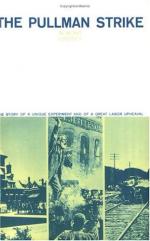|
This section contains 3,209 words (approx. 11 pages at 300 words per page) |

|
 Eugene Victor Debs. The Library of Congress.
Eugene Victor Debs. The Library of Congress.
United States 1894
Synopsis
The Pullman strike—also known as the Chicago strike, Pullman boycott, Debs Revolution, or the American Railway Union strike—was the most dramatic U.S. labor challenge to the power of capital in the 1890s. A local strike that expanded into a national boycott and strike, it grew to include outright class warfare. A turning point for the U.S. labor movement, especially the American Federation of Labor, it was also an economic and political turning point for the United States as a whole. While labor suffered a resounding defeat, the strike lent impetus to both radical labor currents and more moderate social reformers and led directly to what has become known as the Progressive Era of 1900 to 1920.
Timeline
- 1876: General George Armstrong Custer and 264 soldiers are killed by the Sioux at the Little Big Horn River...
|
This section contains 3,209 words (approx. 11 pages at 300 words per page) |

|


